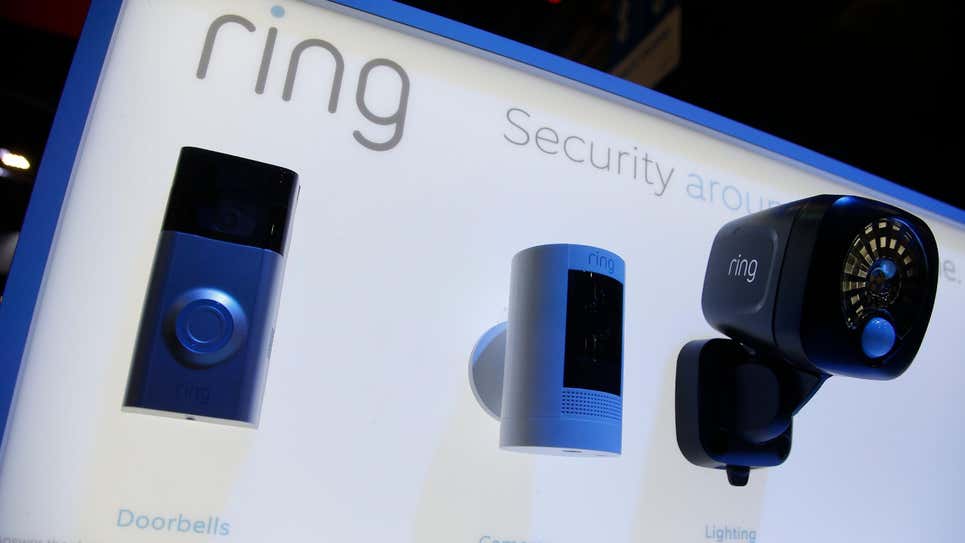New concerns about Ring's audio recording practices are breathing new life into a yearslong inquiry.
 |
| Photo: Ross D. Franklin (AP) |
Sen. Ed Markey on Tuesday said that his office plans to push forward with an already yearslong investigation into “harmful surveillance practices” and “invasive data collection” facilitated by Amazon’s flagship home security product, Ring.
In a letter to Amazon CEO Andrew Jassey—the handpicked replacement of ex-CEO Jeff Bezos, who transitioned to executive chairman last summer—Markey is pushing Amazon to disclose its own internal research into the range and capabilities of the microphones included in Ring cameras and doorbells. Markey (D-Mass.) wrote that while steps taken by the company in response to past concerns were worthy of acknowledgement, he remained troubled by reports that Ring’s products were capturing “vast amounts of audio recordings” in both public and private settings, playing a part in “blackmail, stalking, and other damaging practices.”
“As Ring products capture significant amounts of audio on private and public property adjacent to dwellings with Ring doorbells—including recordings of conversations that people reasonably expect to be private— the public’s right to assemble, move, and converse without being tracked is at risk,” Markey said.
Last month, Consumer Reports testing found that, weather permitting, Ring’s doorbell cameras were capable of picking up audio from up to 20 feet away. Conversations on sidewalks in front of houses, condos, and townhomes, for example, were likely to register clearly. People in apartment buildings may unknowingly be recorded the moment they step outside.
Markey further asked the company to consider disabling default settings that trigger those microphones whenever a Ring device’s cameras are activated, and to pledge never to incorporate voice recognition software into those cameras. Among other requests, Markey is pushing Amazon to disclose the number of private police agencies with access to its software; to never accept financial contributions from police or provide contributions of its own in return; and to permanently ban immigration enforcement agencies from requesting access to its footage. (You can read Markey’s full list of requests here.)
Amazon did not immediately respond to a request for comment.
Outmoded privacy laws offer few—more likely zero—legal avenues for people who might feel concerned about their safety.
These concerns are heightened, Markey said, due to Amazon’s ongoing efforts to recruit police departments into a program designed to grant them access to its footage. Roughly 10 percent of U.S. law enforcement agencies—more than 2,100 departments in total—have signed agreements with Amazon. Officers enrolled in the program are granted access to a police-specific platform, enabling them to solicit footage directly from more than 10 million users on a voluntary basis.
Chris Gilliard, a visiting research fellow at the Harvard Kennedy School Shorenstein Center, said that while the “slight changes” Ring had instituted had made its product more palatable, the company’s clear efforts to blanket the country with its surveillance products was anathema to a free society.
“The letter from Markey asks a lot of essential questions,” Gilliard said. “It’s important to always keep in mind that Amazon and Ring are heavily invested in covering the world in sensors, and replacing a culture of community and trust with one centered on surveillance and control.”
An audit of Ring’s practices last year by the NYU School of Law’s Policing Project identified a range of problematic areas—many of which, it said, Ring had taken steps to address. Ring has, for instance, moved to prohibit posts about low-level crimes that threaten neither property nor public safety in an attempt to assuage concerns related to over-policing. Ring’s internal policies are now “much more transparent,” the auditors said, and at least some attempt has been made to minimize the harms stemming from systemic racial biases reflected in the footage aired publicly by its customers. (“We should not fool ourselves into thinking that profiling and prejudice can be eradicated from social media platforms,” auditors wrote.)
“Citizen-on-citizen surveillance is nothing new, but emerging technologies have transformed our ability to surveil our surroundings and one another,” the NYU report states. “There is now a burgeoning market for these products— from cell phone cameras to drones to license plate readers. There are hundreds of millions of privately-owned surveillance devices in use across the country. And much of this private surveillance can become available to the police.”
Gizmodo previously examined more than 65,000 posts shared by Ring users across its native app, Neighbors. Geographic coordinates hidden within the posts allowed reports to locate roughly 20,000 of its cameras. (While the company denied this constituted a leak of personal data, the ability to access these coordinates was restricted soon after.)
Tags:
Amazon
